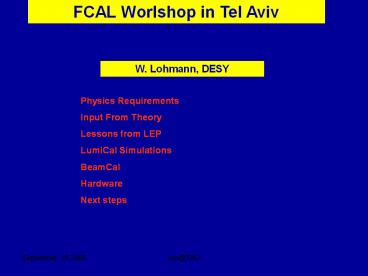FCAL Worlshop in Tel Aviv - PowerPoint PPT Presentation
Title:
FCAL Worlshop in Tel Aviv
Description:
Bhabha MC geberators to approach 10-4 precision ... thank you, Halina, Aharon, Ronen .. All the others. Next steps -ECFA WS in Vienna, Nov. 2005 ... – PowerPoint PPT presentation
Number of Views:28
Avg rating:3.0/5.0
Title: FCAL Worlshop in Tel Aviv
1
FCAL Worlshop in Tel Aviv
W. Lohmann, DESY
Physics Requirements Input From Theory Lessons
from LEP LumiCal Simulations BeamCal
Hardware Next steps
2
Requirements from Physics
- Susy top production- Instrumentation of the
forward region for - background suppression (C. Milstein)
Input from theory
- Two loop ew corrections to Bhabha scattering (T.
Riemann) - ? complete treatment of higher order
contributions in the - Bhabha MC geberators to approach 10-4
precision - Impact of polarisation on the Bhabha cross
section (P. Starovoitov) - ? corrections on the level, need next order
3
Lessons from LEP
Experience with the OPAL detector (D. Strom) ?
control of the inner radius, phi symmetry ? be
careful with material in front of the detector ?
importance of testbeam measurement ? Lumi at 20
mrad crossing angle
LumiCal simulations
- Beam- beam interactions, analytic relationships
(S. Kananov) - Pad and strip design (R. Ingbir, B. Pawlik)
- Background for LumiCal (L. Suszycki, I.
Bozovic-Jelisavcic) - ? Design for small crossing angle is stable
- ? first look to 20 mrad case, background from
beamstrahlung - ? two photon events in the calorimeters, to be
clarified
4
BeamCal simulatons
- Optimal segmentation for electron detection (A.
Elagin) - Comparison of the performance for different ILC
parameters - (V. Drugakov)
- ? ½ RM gives best results
- ? electron veto for different accelerator
settings, geometries, - pushed to high efficiency
Background estimates
Background in the inner detector (K. Buesser) ?
amount of hits is larger for 20 mrad ?
depositions on LumiCal (cover front-face with
carbon?)
5
Hardware developments
- SiD forward region (D. Strom)
- RD with diamond sensors (K. Afanaciev, Ch.
Grah)) - FE electronics (W. Lange)
- Si sensors (W. Wierba, Z. Krumstein)
- ? first design for 20 mrad crossing angle
- ? new results from diamond sensors
- ? electronics concept
- ? Si sensor design, offer from JINR
Beam diagnostics and position monitoring
- Positioning monitoring with a laser beam (W.
Wierba) - Beam diagnstics with BeamCal (Ch. Grah)
- ? monitoring on a few mum level is
demonstrated - ? fast lumi estimate on bunch-by-bunch level
for feedback
6
What has to be done
We need a similar design for 20 mrad crossing
angle -repeating the studies on critical
parameters (as done by achim) -feasibility of
beam diagnostics (magnetic field!) -Studies of
background
- We have to understand Bhabha phenomenology
- -Status of the theory, radiative effects and
detector - performance (clustering)
- - Comparison of different generators (BHLUMI,
- SamBha.)
- - Background studies
- - Realistic readout scheme
7
What has to be done
- Sensor and Readout
- -Continuation of diamond studies (more samples
- with promising diagnostics, linearity,
homogeneity, - high radiation doses.)
- -Si sensor studies (to learn to work with them).
- -Si sensor radiation test.
- -Assembly of full sensor planes ? prototype test.
- -Readout electronics concept, manufacturing of
- prototypes.
- -Concept Design for the fast readout and
- fast diagnostics (related to Eurotev).
8
General remark
- -It was a perfectly organised meeting
- -We learned a lot on
- Physics (Y. Grossman )
- Culture, history, restaurants .
- thank you, Halina, Aharon, Ronen .. All the
others
Next steps
-ECFA WS in Vienna, Nov. 2005 contributions on
theory inputs,
detector performmance,
background studies,
hardware, beam
diagnostics..































